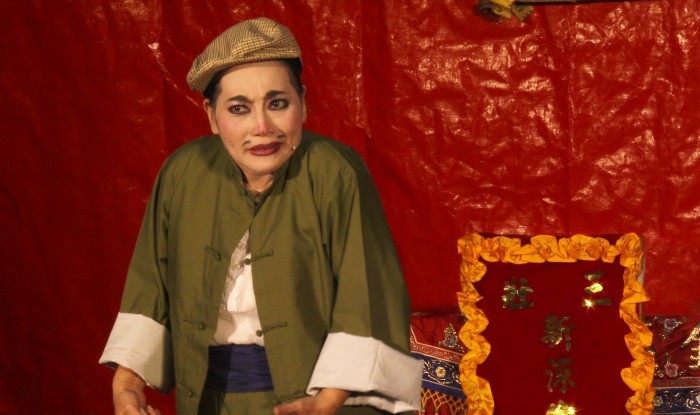
The Opera Troupe “Zhuang San Xin Liang-le” was established 20 years ago in Yilan City. After the old mentor passed away, the son CHEN Mao-yi became the leader, and took over the mission to inherit “Local Taiwanese Opera”. 20 years later, the painstaking troupe was certified as “important cultural heritage reservation group”, and received national subsidy. However, the administrative verification as well as the evaluative regulations led to the inner corruption of this troupe. Rolling on the Stage, Rolling for Life is the latest work by director WU Yao-tung, whose previous work Swimming on the Highway has been selected in numerous domestic and international festivals.
He shot and recorded the life and development of “Zhuang San Xin Liang-le Opera Troupe”, which also resembles a miniature of the cultural community in Taiwan. The following is our interview record with director WU Yao-tung:
Q: You received the fund of high-resolution image production from the Ministry of Culture for making this film, but the film revealed the inner-contradiction of the performance group who also got the grant from the Ministry of Culture. It seems that the performance groups have not necessarily benefited from the fund. Is this one aspect you wanted to show in the first place?
At first we only knew that brother CHEN Mao-yi worked wholeheartedly in order to promote and bring the opera troupe to a national level. He wanted to pass down the artistic tradition as his father did before. Later on, they learned that there’s a subsidiary program from Ministry of Culture. Some scholars such as LIN Mao-hsien, specialized in traditional Taiwanese opera, were always supportive. Eventually the troupe got the subsidy successfully.
The best thing of the subsidy is “fund”. Only when the troupe have money can they continue to operate. Otherwise, CHEN Mao-yi would have to use his own money, or perform during religious events to get some income. Furthermore, receiving fund is like a symbol of recognition, so everyone was happy for him at that time.
But later on, they started to worry. As all of the troupe members are amateur, they mostly joined the out of sheer interest. However, when the troupe is certified, many rules and requirements come out into view, such as the members need to hand in assignments, or to perform in a regular basis. These obligations became exhausted, because the members are from various walks of life, and they have to take care of their children or do other tasks. “Why do we have to make it such tiring?” From here on, the members started to hold different opinions.
I filmed this process and edited into a trailer to report to the Ministry of Culture. Since the juries were all writers, scholars, and directors instead of governmental officials, they told me to “follow up the issue carefully”. “Don`t try to avoid or be afraid of it.” They encouraged me, and asked me to add these conflicts and contradictions between the troupe and the culture department into the film.
Q: In the film, there were many touching scenes when discussions, quarrels, or fights happened. How did you manage to capture those truest moments? Or how did you manage to let the members neglect the existence of the camera?
Firstly, I have known them since 2009, so we are very close to each other. Secondly, I suppose it was because of their characteristics. All of them are very honest and are from my parents’ generation. Village people are extremely passionate. Moreover, after getting familiar with brother CHEN, he took good care of me especially and supported me a lot. Having such a leader like brother CHEN, everyone became equivalently very open. Of course I also became acquainted with the members when getting along with them longer.
After fighting for a few times, I can even change my filming position during their argument. They would continue without caring for me as if I am an invisible man. At that moment, you would understand that you are a team of them. That’s a really good feeling. They will not come to you the next day and tell me “Don’t put that scene into the film”. Instead, they will come and say “Don’t you think what that guy said to me was very unreasonable?” Interestingly, sometimes I even have to pass the word for them. They are full of passion, kindness, and honesty, who don’t really care about what my film will be like.
Q: Can you recall any particularly interesting things during the filming process?
One of the most profound memories was the moment when brother CHEN said to me “Now we could be together again”. In fact, the longer and the more I film, the less things I feel and have in mind. If I were younger now, seeing brother CHEN getting worse every day because of cancer would urge me to film harder. But as I was such intimate friends with him, I was full of grief in mind instead of making records. Thus, when brother CHEN went to the hospital to do the chemotherapy, I did not even follow behind to film him. I know I could not and would not like to do that.
Of course, his spirit still wanders through the film. I did not film his sickness and the process of his chemotherapy. Instead, I filmed the time he went to fulfill his wishes once he knew he was about to die. This is the way I like. I do not like to show someone lying in the hospital, showing how dreadful and miserable one is. Therefore, you asked me what was the most impressive and joyful moment during the filming process, I would say, the time when he said to me “we could be together.”
For more information about Rolling on the Stage, Rolling for Life, please click here.
(Translated by Shin-jie LEE)
